小学英语小升初衔接班第2讲 交际用语
小升初英语专题情景交际
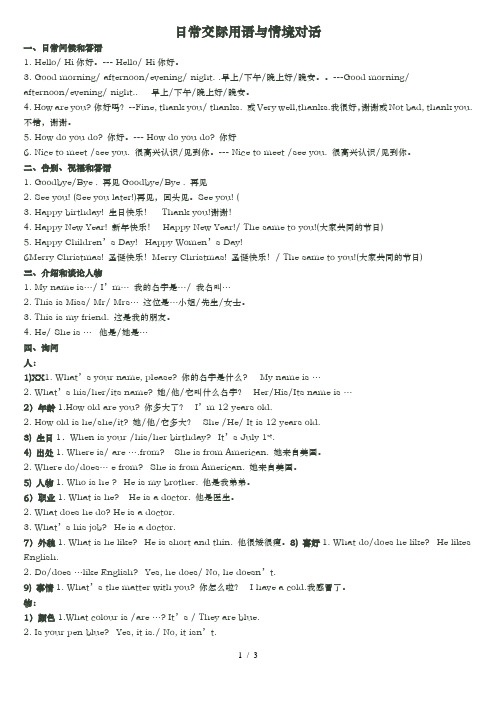
日常交际用语与情境对话一、日常问候和答语1. Hello/ Hi你好。
--- Hello/ Hi你好。
3. Good morning/ afternoon/evening/ night. .早上/下午/晚上好/晚安。
---Good morning/afternoon/evening/ night.. 早上/下午/晚上好/晚安。
4. How are you? 你好吗?--Fine, thank you/ thanks. 或Very well,thanks.我很好,谢谢或Not bad, thank you. 不错,谢谢。
5. How do you do? 你好。
--- How do you do? 你好6. Nice to meet /see you. 很高兴认识/见到你。
--- Nice to meet /see you. 很高兴认识/见到你。
二、告别、祝福和答语1. Goodbye/Bye . 再见Goodbye/Bye . 再见2. See you! (See you later!)再见,回头见。
See you! (3. Happy birthday! 生日快乐!Thank you!谢谢!4. Happy New Year! 新年快乐!Happy New Year!/ The same to you!(大家共同的节日)5. Happy Children’s Day!Happy Women’s Day!6Merry Christmas! 圣诞快乐!Merry Christmas! 圣诞快乐!/ The same to you!(大家共同的节日)三、介绍和谈论人物1. My name is…/ I’m… 我的名字是…/ 我名叫…2. This is Mis s/ Mr/ Mrs… 这位是…小姐/先生/女士。
3. This is my friend. 这是我的朋友。
4. He/ She is …他是/她是…四、询问人:1)XX1. What’s your name, please? 你的名字是什么? My name is …2. What’s his/her/its name? 她/他/它叫什么名字?Her/His/Its name is …2)年龄1.How old are you? 你多大了?I’m 12 years old.2. How old is he/she/it? 她/他/它多大?She /He/ It is 12 years old.3) 生日1.When is your /his/her birthday? It’s July 1st.4) 出处1. Where is/ are ….from?She is from American. 她来自美国。
(PEP)六年级英语下册 小升初英语(全国通用)复习 基础日常交际用语
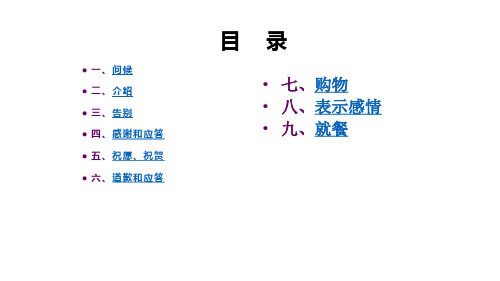
如果有一方要外出较长的时间的话,则不宜用这一 语。
Good night. 晚安。(读时用升调)
此句不要译为:“晚上好。”“Good night.”是 用 于 临 睡 前 的 道 别 用 语 , 相 当 于 汉 语 的 “ 晚 上回睡目个录页 好觉。”的意思。
(3)节假日的祝贺:
Happy New Year! 新年快乐! Merry Christmas! 圣诞节快乐! Happy birthday to you! 生日快乐! Happy Valentine’s Day! 情人节快乐 !
回目录页
六、道歉和应答
(1)表示道歉:
I'm sorry.(或:Sorry.) 对不起。 I'm sorry for/about… 例如:I'm sorry for coming late. 对不起,我来迟 了。
回目录页
Hello/Hi. 你好。 要好的朋友或同辈之间,在非正式场合下才可 以用这一用语。例如: Hi! Morning/Arternoon/Evening! Long time no see! 好久不见了!
How are you? 你好吗? 这句用语主要用于询问对方的身体健康情况。 如果问对方的家人,可以这样说: How is your f a t h e r / m o t h e r / b r o t h e r / s i s t e r, e t c ? 对于首次认识的陌生人,不要这样打招呼。
如果表示更礼貌些的话,前边还可以加上:
Good morning/afternoon/evening, sir/… I'm a student/worker,etc (here). 我的名字是…… 我是(这里)的一名学生(工人,……)。
Starter Units 小初衔接

Starter Units 小初衔接1. hello&hihello “你好”,是朋友、亲人或者熟人之间非正式的问候语,可以用来表示问候、打招呼或引起对方注意,回答时用hello或hi均可。
hi 和hello一样也是“你好”的意思,在美国用的非常普遍,不仅用于熟人之间,也用于陌生人之间,比hello更简洁和随便,尤其用于擦肩而过的打招呼。
例如:-Hello/Hi, Bob! 你好, 鲍勃!-Hello/Hi, John. 你好,约翰。
注意:(1)打电话时一般用hello而不用hi。
例如:Hello, this is Mary. 喂,我是玛丽。
(2)人注意的时候,两者都可以用。
例如:Hello/Hi, is anyone there? 喂,那儿有人吗?(3)对老师、上级、年长者以及有身份地位的人打招呼时,一般不用hello和hi,以免对其显得不尊重。
此时要根据具体的场合选择不同的正式的问候语。
例如:Good morning, Miss Wang. 早上好,王老师。
(4)第一次介绍朋友时,人们还是愿意用比较正式的问候语。
例如:How do you do? 你好。
Nice to meet you. 很高兴见到你。
2. thanks“Thanks.” 相当于“Thank you.”,在英美等国家是使用频率最高的礼貌用语。
当别人帮助、关心、问候、祝福我们时,应使用“Thank you/Thanks” 应答,表示谢意。
由于文化的差异,当得到对方的称赞、夸奖时,英美人也用“Thank you./Thanks.”来应答,以示礼貌。
这点与我们中国人不同。
例如:-You look nice in this skirt. 你穿这件裙子看起来很漂亮。
-Thanks. / Thank you. 谢谢!3. please“please”意为“请”。
在句中表示礼貌或客气,可置于句首,也可置于句末;置于句末时,前面要用逗号隔开。
小升初英语衔接班 50个绝佳口语句型
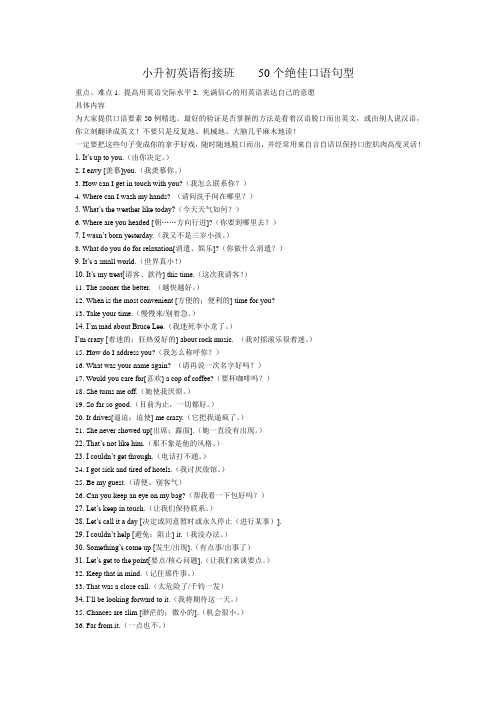
小升初英语衔接班50个绝佳口语句型重点、难点1. 提高用英语交际水平2. 充满信心的用英语表达自己的意愿具体内容为大家提供口语要素50例精选。
最好的验证是否掌握的方法是看着汉语脱口而出英文,或由别人说汉语,你立刻翻译成英文!不要只是反复地、机械地、大脑几乎麻木地读!一定要把这些句子变成你的拿手好戏,随时随地脱口而出,并经常用来自言自语以保持口腔肌肉高度灵活!1. It’s up to you.(由你决定。
)2. I envy [羡慕]you.(我羡慕你。
)3. How can I get in touch with you?(我怎么联系你?)4. Where can I wash my hands? (请问洗手间在哪里?)5. What’s the weather like today?(今天天气如何?)6. Where are you headed [朝……方向行进]?(你要到哪里去?)7. I wasn’t born yesterday.(我又不是三岁小孩。
)8. What do you do for relaxation[消遣、娱乐]?(你做什么消遣?)9. It’s a small world.(世界真小!)10. It’s my treat[请客、款待] this time.(这次我请客!)11. The sooner the better. (越快越好。
)12. When is the most convenient [方便的;便利的] time for you?13. Take your time.(慢慢来/别着急。
)14. I’m mad about Bruce Lee.(我迷死李小龙了。
)I’m crazy [着迷的;狂热爱好的] about rock music. (我对摇滚乐很着迷。
)15. How do I address you?(我怎么称呼你?)16. What was your name again? (请再说一次名字好吗?)17. Would you care for[喜欢] a cop of coffee?(要杯咖啡吗?)18. She turns me off.(她使我厌烦。
人教新目标版小升初英语衔接必备知识: Unit2 This is my sister Section A(解析版)
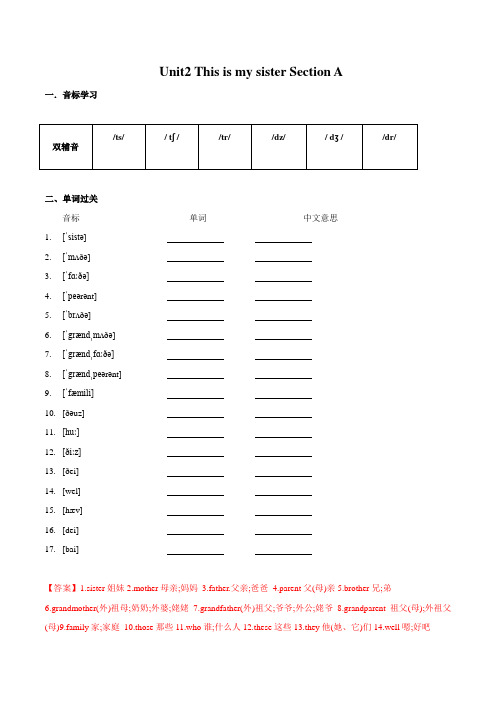
Unit2 This is my sister Section A一.音标学习二、单词过关音标 单词中文意思 1.2.3.4.5.6.7.8.9.10.11.12.13.14.15.16.17.【答案】1.sister 姐妹2.mother 母亲;妈妈 3.father.父亲;爸爸 4.parent 父(母)亲5.brother 兄;弟6.grandmother(外)祖母;奶奶;外婆;姥姥7.grandfather(外)祖父;爷爷;外公;姥爷8.grandparent 祖父(母);外祖父(母)9.family 家;家庭 10.those 那些11.who 谁;什么人12.these 这些13.they 他(她、它)们14.well 嗯;好吧15.have经受;经历16.day一天;一日;白天17.bye再见三、课文学习Sally: Good morning, Jane.Jane: Good morning, Sally.Sally: Oh, Jane, this is my sister Kate. Kate, this is my friend Jane.Kate: Nice to meet you, Jane. Jane: Nice to meet you, too. Are those your parents Kate: Yes, they are.Jane: And who's he?Sally: He's my brother, Paul. Jane: Oh, I see. Well, have a good day!Sally/Kate: Thanks! You, too. Bye!随堂练习一.根据语境及所给汉语提示,写出所缺单词。
1. Alice and Helen are my ________(姐姐).2. His two ________(哥哥) are at school.3. —What are ________(那些), Dale?—They are cups.4. Bill's ________(父母亲) are not English.5. Hello! Are you Sonia's ________(爷爷)?6. This is Lily's ________(奶奶). Her first name is Betty.二根据语境,从方框中选择恰当的单词填空,有的需要变换形式,每词限用一次。
小升初语法提升-情景交际2 通用版(共47张PPT)

考点笔记
(2)应答常用语
Yes./Sure./Certainly. 是的。/行。/当然可以。 Yes,please. 可以,请吧。
Of course (you may).当然(你可以)。
OK./All right.好的。
Certainly not./Of course not. 当然不会。
Not at all.没问题
When is your/his/her birthday? It's in April/August/October...
你/他/她的生日是什么时候?
在四月/八月/十月…..
Where is /are...from?…来自哪儿? ….am/is/are...…来自……
Where do/e from?
Speaking.
考点笔记
Hello!May/Can/Could I speak to..? 你好!请……接电话好吗? Hello! Is...in?喂,你好!……在家吗? Is that.….peaking?你是……吗? Who's it/that?你是谁呀? Who is calling,please?请问你是谁? May I ask who's calling,please? 我可以问一下你是谁吗?
A cup of tea, please.
Can I help you?
考点笔记
(1)提供帮助常用语
Can/Could/Shall I help you? 我能帮你吗? What can I do for you? 我能为你做点什么? Is there anything I can do for you? 有什么我能为你做的吗? Do you want me to...? 你要我做……吗? Would you like some...? 你想要点……吗? Let me do/carry...for you .让我为你做/为你搬……
小升初衔接班英语

小升初衔接班英语讲义(一)一基础知识点。
(一)、单词。
Aa [ei] Bb [bi:] Cc [si:] Dd [di:] Ee [i:] Ff [ef] Gg[dʒi:] Hh[eit∫]Ii[ai] hi[hai:] 嗨haw[hau:] 怎样hello[hə’ləu] 你好you [ju:] 你,你们I [ai]我are[a:] 是am[æm] 是fine[fæin] 好name[neim] 名字thanks[θæŋks]谢谢afternoon[a:ftə’nu:n] 下午evening[’i:vniŋ] 晚上morning[mɔ:niŋ] 早上(二)、词组。
1.HB2.BBC3.CDA6.UN7.UFOTV9.NBA 10.P.E(三)、句子1.Good morning, Helen.2.How are you?3. I am fine,thank you.And you?4.Hi, Cindy.(四)、重点。
1.音标元音12个单元音长元音[i:] [] [] [u:] [a:]短元音[i] [] [ɔ] [u] [] [e] [] 8个双元音[ai] [ei] [ɔi] [i] [εə] [əu] [u] [au]2.字母书写3.英语中常见的问候语:Good morning ; Hello; Hi; How are you?Nice to meet you.4.常见的感谢用语:Thank you; Thanks.回答:That’s OK. Y ou are welcome.一、练习题。
(一)选出你所听到音标1、()A、[ i: ] B、[ i ] C、[ ə ] D、[ei ]2、( ) A 、[Λ] B 、[ æ ] C 、[ a: ] D 、[ai ]3、( ) A 、[ ei ] B 、[ ai ] C 、[ ɔi ] D 、[ i ə ]4、( ) A 、[ u ] B 、[u: ] C 、[ ɔ ] D 、[ ɔ: ]5、( ) A 、[ i ə ] B 、[u ə ] C 、[e ə ] D 、[əu ] (二)将下列方框中的缩略词添在与其对应的中文后面的横线上。
小升初衔接班英语讲义二
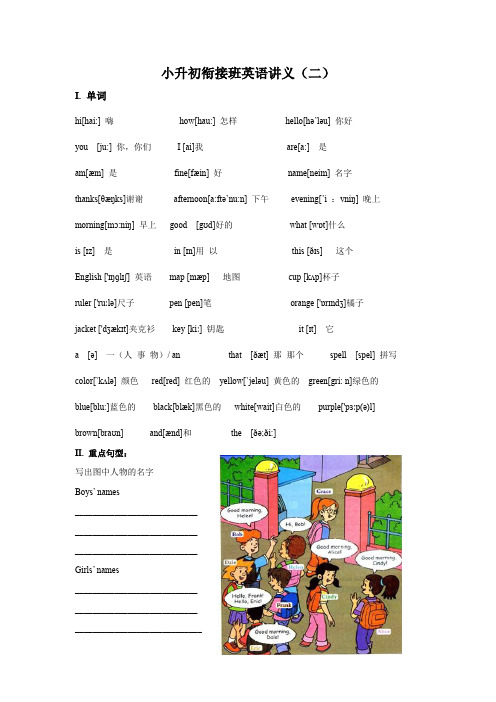
小升初衔接班英语讲义(二)I. 单词hi[hai:] 嗨how[hau:] 怎样hello[hə’ləu] 你好you [ju:] 你,你们I [ai]我are[a:] 是am[æm] 是fine[fæin] 好name[neim] 名字thanks[θæŋks]谢谢afternoon[a:ftə’nu:n] 下午evening[’i :vniŋ] 晚上morning[mɔ:niŋ] 早上good [gʊd]好的what [wɒt]什么is [ɪz] 是in [ɪn]用以this [ðɪs] 这个English ['ɪŋɡlɪʃ] 英语map [mæp] 地图cup [kʌp]杯子ruler ['ruːlə]尺子pen [pen]笔orange ['ɒrɪndʒ]橘子jacket ['dʒækɪt]夹克衫key [kiː] 钥匙it [ɪt] 它a [ə] 一(人事物)/ an that [ðæt] 那那个spell [spel] 拼写color[`kʌlə] 颜色red[red] 红色的yellow[`jeləu] 黄色的green[gri: n]绿色的blue[blu:]蓝色的black[blæk]黑色的white[wait]白色的purple['pɜːp(ə)l] brown[braʊn] and[ænd]和the [ðə;ði:]II. 重点句型:写出图中人物的名字Boys’ names____________________________________________________________________________________Girls’ names_____________________________________________________________________________________对话句型:Cindy:Good morning , Alice! Alice:Good morning , Cindy! Bob:Good morning Helen Helen:Hi,BobDale:Hello,Frank. Hello, Eric. Frank&Eric: Good morning, Dale.对话二:A:Good evening ,Alice!B: Good evening,BobA:Good afternoonB: Good afternoonCindy:Good afternoon. Dale! Dale: Hi ,Cindy ! How are you ? Cindy: I’m fine , thanks . And you? Dale: I’m ok.说出图中出现的物品的英文名对话A: What’s this in English?B: It’s a jacketA: What’s that in English?B : It’s an orange.A: Spell it, please.B: O -R -A -N -G -E, orange课堂练习:对话:A: What’s that/ this?B: It’s ZA: What color is it?B: .It’s green.III. 语法知识。
小学英语中的日常交际用语
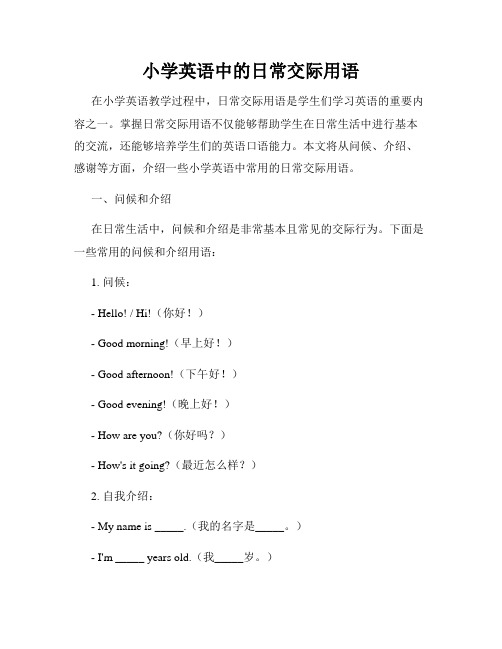
小学英语中的日常交际用语在小学英语教学过程中,日常交际用语是学生们学习英语的重要内容之一。
掌握日常交际用语不仅能够帮助学生在日常生活中进行基本的交流,还能够培养学生们的英语口语能力。
本文将从问候、介绍、感谢等方面,介绍一些小学英语中常用的日常交际用语。
一、问候和介绍在日常生活中,问候和介绍是非常基本且常见的交际行为。
下面是一些常用的问候和介绍用语:1. 问候:- Hello! / Hi!(你好!)- Good morning!(早上好!)- Good afternoon!(下午好!)- Good evening!(晚上好!)- How are you?(你好吗?)- How's it going?(最近怎么样?)2. 自我介绍:- My name is _____.(我的名字是_____。
)- I'm _____ years old.(我_____岁。
)- I'm from _____.(我来自_____。
)- Nice to meet you.(很高兴见到你。
)二、请求和表达意愿在日常生活中,我们常常需要请求别人的帮助或者表达自己的意愿。
以下是一些常用的请求和表达意愿的用语:1. 请求:- Can you help me, please?(请你帮帮我,好吗?)- Could you please pass me the book?(你能请把书递给我吗?)- May I use your pencil?(我可以用你的铅笔吗?)- Would you mind closing the window?(你介意关上窗户吗?)2. 表达意愿:- I want to go to the park.(我想去公园。
)- I would like some water, please.(我想要一些水。
)- I hope to see you again.(希望再次见到你。
)- I prefer playing basketball to playing soccer.(我更喜欢打篮球而不是踢足球。
小升初英语口语短对话
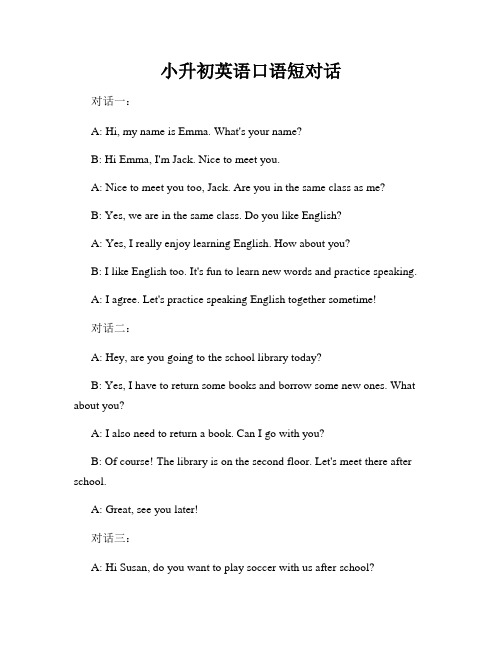
小升初英语口语短对话对话一:A: Hi, my name is Emma. What's your name?B: Hi Emma, I'm Jack. Nice to meet you.A: Nice to meet you too, Jack. Are you in the same class as me?B: Yes, we are in the same class. Do you like English?A: Yes, I really enjoy learning English. How about you?B: I like English too. It's fun to learn new words and practice speaking.A: I agree. Let's practice speaking English together sometime!对话二:A: Hey, are you going to the school library today?B: Yes, I have to return some books and borrow some new ones. What about you?A: I also need to return a book. Can I go with you?B: Of course! The library is on the second floor. Let's meet there after school.A: Great, see you later!对话三:A: Hi Susan, do you want to play soccer with us after school?B: I would love to! But I'm not very good at soccer. Can I still join?A: Of course, everyone is welcome to play. It's all about having fun! B: That's true. I'll bring my soccer ball and meet you on the playground. A: See you there!对话四:A: Mom, can I go to Tim's house to study for the English test?B: Sure, but make sure you finish your homework first.A: I've already finished all my homework. Can I go now?B: Alright, but be back home before dinner time.A: Thank you, Mom. I'll be back on time!对话五:A: Andy, are you going to the school dance next week?B: Yes, I am. Are you going too?A: Yeah, I just bought a new dress for the dance. It's really pretty.B: That's awesome! I'm still looking for a nice suit to wear.A: Don't worry, I can help you find a suit. Let's go shopping after school. B: Thanks, you're the best!对话六:A: Hi Peter, are you going to the field trip to the science museum?B: Yes, I am. I'm really excited to learn more about science.A: Me too! It's going to be a fun and educational trip.B: I heard we will see experiments and interactive exhibits.A: That sounds amazing. I can't wait for the trip!对话七:A: Jenny, do you know if there will be a math quiz tomorrow?B: Yes, our teacher announced it today. We need to study tonight. A: Oh no, I forgot to review the math lessons. Can you help me study? B: Of course, let's meet at the library after school and review together. A: Thank you so much, I really appreciate your help!对话八:A: Hey, do you know where the basketball court is?B: Yes, it's behind the school building. You can't miss it.A: Thanks, I'm new to this school and I couldn't find it on my own. B: No problem, I can show you the way. Let's go together.A: That would be great, thank you!对话九:A: Hi Lisa, can you lend me your English textbook?B: Sure, but I need it back by tomorrow. I have a test to study for.A: Don't worry, I promise to return it before your test.B: Thank you, I really appreciate it. Good luck with your studying! A: Thanks, I'll make sure to take good care of your textbook.对话十:A: Mike, did you finish the art project for Mrs. Johnson's class?B: Yes, I finished it yesterday. Did you finish yours too?A: No, I'm still working on it. I'm having trouble deciding on a topic. B: Why don't you do a landscape painting? It's always a safe choice. A: That's a good idea. I'll start working on it right away. Thanks! B: You're welcome, let me know if you need any help.以上是小升初英语口语短对话,希望对你有帮助。
小升初英语必考儿童对话总结
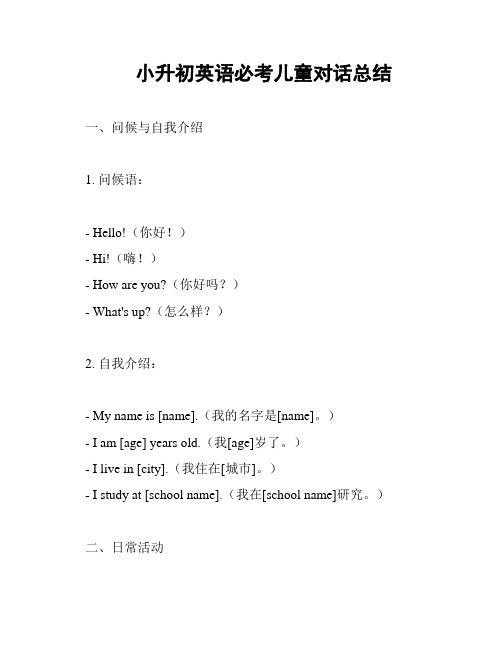
小升初英语必考儿童对话总结一、问候与自我介绍1. 问候语:- Hello!(你好!)- Hi!(嗨!)- How are you?(你好吗?)- What's up?(怎么样?)2. 自我介绍:- My name is [name].(我的名字是[name]。
)- I am [age] years old.(我[age]岁了。
)- I live in [city].(我住在[城市]。
)- I study at [school name].(我在[school name]研究。
)二、日常活动1. 询问和回答日常活动:- What do you usually do in your free time?(你通常在闲暇时间做什么?)- I like to play soccer.(我喜欢踢足球。
)- Do you have any hobbies?(你有什么爱好吗?)- Yes, I enjoy painting.(是的,我喜欢绘画。
)- No, I don't have any hobbies.(不,我没有任何爱好。
)2. 表达日常活动喜好:- I like [activity].(我喜欢[活动]。
)- I dislike [activity].(我不喜欢[活动]。
)- My favorite activity is [activity].(我最喜欢的活动是[activity]。
)三、学校生活1. 询问和回答学校生活:- What's your favorite subject in school?(你最喜欢的科目是什么?)- My favorite subject is English.(我最喜欢的科目是英语。
)- Who is your favorite teacher?(你最喜欢的老师是谁?)- My favorite teacher is Mr./Mrs. [teacher's name].(我最喜欢的老师是[老师的名字]。
小学生英语口语交际用语与经典对话
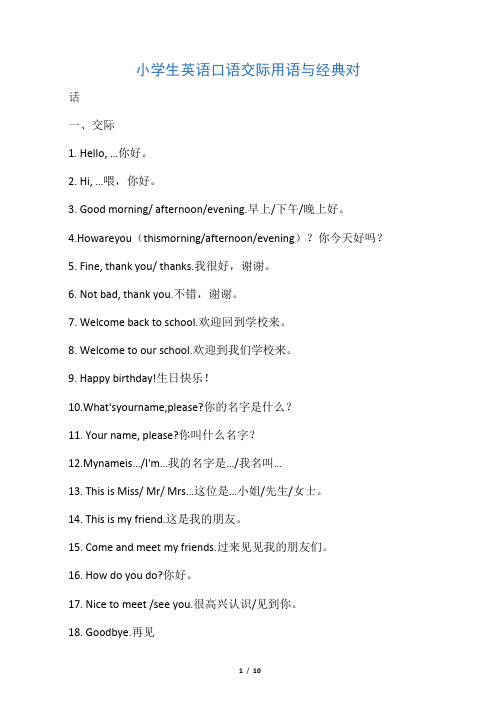
小学生英语口语交际用语与经典对话一、交际1. Hello, …你好。
2. Hi, …喂,你好。
3. Good morning/ afternoon/evening.早上/下午/晚上好。
4.Howareyou(thismorning/afternoon/evening)?你今天好吗?5. Fine, thank you/ thanks.我很好,谢谢。
6. Not bad, thank you.不错,谢谢。
7. Welcome back to school.欢迎回到学校来。
8. Welcome to our school.欢迎到我们学校来。
9. Happy birthday!生日快乐!10.What'syourname,please?你的名字是什么?11. Your name, please?你叫什么名字?12.Mynameis…/I'm…我的名字是…/我名叫…13. This is Miss/ Mr/ Mrs…这位是…小姐/先生/女士。
14. This is my friend.这是我的朋友。
15. Come and meet my friends.过来见见我的朋友们。
16. How do you do?你好。
17. Nice to meet /see you.很高兴认识/见到你。
18. Goodbye.再见19. Good night.晚安。
2019How old is he?他多大了?21. Thank you./ Thanks.谢谢。
22. You're welcome.不用谢。
23. That's all right.没关系。
24. I'm sorry.对不起。
25. Sorry, I don't know.对不起,我不知道。
26. Excuse me.对不起,打扰一下。
27. Come in, please.请进。
28. Have some bananas, please.请吃些香蕉。
小升初英语口语对话素材
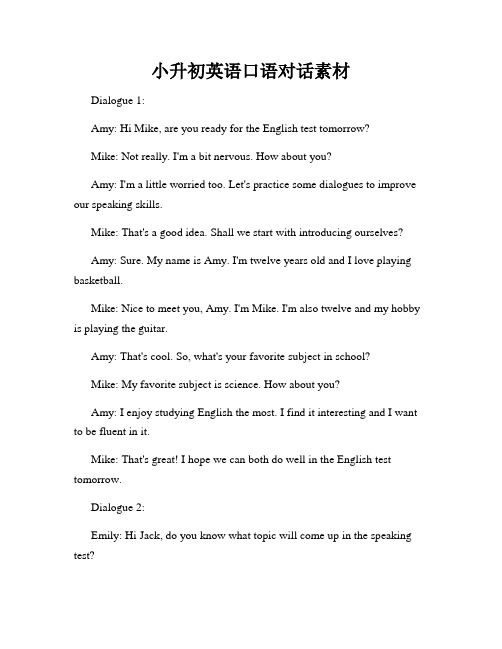
小升初英语口语对话素材Dialogue 1:Amy: Hi Mike, are you ready for the English test tomorrow?Mike: Not really. I'm a bit nervous. How about you?Amy: I'm a little worried too. Let's practice some dialogues to improve our speaking skills.Mike: That's a good idea. Shall we start with introducing ourselves?Amy: Sure. My name is Amy. I'm twelve years old and I love playing basketball.Mike: Nice to meet you, Amy. I'm Mike. I'm also twelve and my hobby is playing the guitar.Amy: That's cool. So, what's your favorite subject in school?Mike: My favorite subject is science. How about you?Amy: I enjoy studying English the most. I find it interesting and I want to be fluent in it.Mike: That's great! I hope we can both do well in the English test tomorrow.Dialogue 2:Emily: Hi Jack, do you know what topic will come up in the speaking test?Jack: I'm not sure, but it could be about our daily routine. Let's practice talking about it.Emily: Okay. Can you tell me about your daily routine?Jack: Sure. I usually wake up at 7 o'clock in the morning and have breakfast. Then, I go to school.Emily: What time do you have lunch at school?Jack: We have lunch at 12 o'clock. After that, we have a short break before continuing with classes.Emily: How about in the afternoon? Do you have any extracurricular activities?Jack: Yes, I play soccer with my friends after school. It's a lot of fun.Emily: That sounds exciting. What time do you go to bed?Jack: I usually go to bed at 9 o'clock, but sometimes I stay up a bit later to finish my homework.Emily: Thanks for sharing, Jack. It's nice to know about your daily routine.Dialogue 3:Sophie: Hey Mark, do you enjoy reading books in English?Mark: Yes, I do. Reading helps me improve my vocabulary and comprehension skills. How about you?Sophie: I like reading too. What types of books do you usually read?Mark: I enjoy reading adventure and mystery novels. They keep me engaged and curious about what happens next.Sophie: That's interesting. I prefer reading fantasy books. They take me to imaginary worlds and spark my imagination.Mark: That's great. Reading different genres can broaden our horizons and expose us to new ideas.Sophie: Absolutely. By reading in English, we can also learn more about the culture and traditions of English-speaking countries.Mark: I completely agree. Let's keep reading and exploring the wonderful world of English literature.Dialogue 4:Tom: Hi Sarah, how do you practice speaking English outside of school?Sarah: I often watch English movies and TV shows with subtitles. It helps me improve my listening and speaking skills.Tom: That's a good strategy. I also find it helpful to listen to English songs and try to sing along.Sarah: Singing is a fun way to practice pronunciation and intonation. Do you have any other tips?Tom: Another useful tip is to find a language exchange partner. We can chat with them in English and vice versa.Sarah: That's a great idea. It's beneficial to have conversations with native English speakers or fellow learners.Tom: Definitely. We can also join English clubs or activities to interact with others and enhance our speaking abilities.Sarah: Let's make an effort to practice speaking English as much as possible outside of the classroom.Dialogue 5:Lily: Hi Peter, how do you prepare for the English speaking test?Peter: I usually practice with flashcards to memorize new vocabulary and phrases. How about you?Lily: I like using online language apps to practice speaking and listening exercises. They provide instant feedback.Peter: That's a good approach. I also find it helpful to record myself speaking and listen back for any mistakes.Lily: Self-assessment is a great way to identify areas for improvement. Do you have any other study tips?Peter: I recommend watching English videos or podcasts to immerse ourselves in the language and improve our accents.Lily: That sounds like a useful technique. Let's continue using different methods to enhance our English speaking skills.Peter: Sure, let's keep practicing and make progress together.Note: The dialogues provided above are indicative examples and can be expanded or modified as per the writer's preference and requirements.。
小学英语基本交流用语

1. I feel sick. - 我觉得不舒服。 2. I have a headache. - 我头疼。 3. I need to see a doctor. - 我需要看医生。 4. It hurts here. - 这里疼。 5. I’m feeling better now. - 我现在感觉好一些了。
发?
在朋友或家庭中
1. Let's play [game]! - 我们来玩[游戏]吧! 2. I'm hungry. - 我饿了。 3. Can we go to the park? - 我们可以去公园吗? 4. It's my turn. - 轮到我了。 5. Can you teach me how to [activity]? - 你能教我怎么[活动]吗?
12. I am from [Country/City]. - 我来自[国家/城市]。
日常对话
1. What's this? - 这是什么? 2. It's a [object]. - 这是一个[物品]。 3. How's the weather today? - 今天天气怎么样? 4. It's sunny / rainy / cloudy. - 天气晴朗/下雨/多云。 5. What time is it? - 现在几点了? 6. It's [time]. - 现在是[时间]。 7. Can you help me? - 你能帮我吗? 8. Sure! What do you need? - 当然可以!你需要什么? 9. I like your [object]. - 我喜欢你的[物品]。 10. Thank you very much! - 非常感谢!
- 1、下载文档前请自行甄别文档内容的完整性,平台不提供额外的编辑、内容补充、找答案等附加服务。
- 2、"仅部分预览"的文档,不可在线预览部分如存在完整性等问题,可反馈申请退款(可完整预览的文档不适用该条件!)。
- 3、如文档侵犯您的权益,请联系客服反馈,我们会尽快为您处理(人工客服工作时间:9:00-18:30)。
小升初英语衔接班第2讲交际用语交际用语二. 重点、难点按交际项目分类总结交际用语三. 具体内容(一)祝愿、祝贺和应答(Good wishes, congratulations and responses)1. —Well done and congratulations to you. —Thanks very much.2. —I hope you’ll succeed in everything. —So do I.3. —I wish you success. —Thank you.4. —We send you our best wishes. —Thank you very much.5. —Happy new year ! —Happy new year!(The same to you.)6. —A merry Christmas to you. —Thank you.7. —I hope you’ll have a good time.—Thank you.8. —Happy Birthday! —Thank you.(二)邀请和应答(Invitations and responses)1. —Would you like to come to the party? —Oh yes, thank you.2. —I hope you can come to the dance next Saturday. —I’m sorry, but I can’t.3. —Will you go dancing with us? —Of course. I'll be glad to.4. —Will you come to our English Evening? —Yes, thank you.5. —Would you please give us a talk on English Learning? —OK. When?6. —You and your friends must come over to my house and see mooncakes.—OK. Thank you very much.(三)表示同意和不同意(Expressing agreement and disagreement)1. —I think the shop is closed at this time of day.—No, I think it’s open.2. —I think foreign languages are more interesting than science.—I really can’t agree with you. I prefer science.3. —I think I shall read a book instead.—Good idea. That’s muc h better than watching a bad TV Programme.4. —I don’t think that it's true. He’s always telling strange stories.—I know. But this time I can’t decide if he is right or not.5. —I think Chinese is more popular than any other subject. —Maybe. But I prefer art.6. —Don’t think in Chinese when you’re speaking English. —You are quite right.(四)道歉和应答(Apologies and responses)1. —Sorry to trouble you. —That’s all right.2. —Oh, I am so sorry. —That’s quite all right.3. —I’m sorry to give you so much troubl e. —No trouble at all.4. —I’m sorry. I lost the key to your bike.—It doesn’t matter.5. —Sorry to have kept you waiting for a long time. —It doesn’t matter.6. —You haven’t paid for it yet.—Oh, I’m really very sorry.(五)劝告和建议(Advice and suggestions)1. —The park isn’t far from here. Shall we walk there?—OK.2. —You’d better close the windows. It’s cold in the room. —All right.3. —If you are not better by then, I’ll take you to see the doctor.—OK. Thank you very much.4. —You must look after yourself and keep healthy. —Yes, I will. Thanks.5. —The museum is very far from here. Let’s catch a bus, shall we?—OK. Let's catch a bus.6. —You must remember the saying: Whatever you do, do it well.—Thank you for your advice.(六)打电话(Making telephone calls)1. —Hello! —Hello, Bill? —No, this is Sam. —Hi, Sam. This is Mike. How are you?2. —Hello. —Hello. May I speak to Mr. Green?3. —No. 5 Middle School. —Mr. Green, please. —I’m sorry. Mr. Green is not in.—When will he be back? —About six this afternoon. —All right. I'll ring again then. —Very well.4. —Hello! —Hello, Han Mei. Could I borrow your Chinese-English Dictionary please? —Sorry! It’s not a very good line. Could you speak more loudly?—Could I borrow your Chinese-English dictionary?—Sure. I’ll bring it to you tomorrow.—Thank you. Goodbye.(七)请求允许和应答(Asking for permission and responses)1. —Please let me help you. —No, thanks. I can carry it.2. —Can I see your licence, please? —OK.3. —May I call you James? —Of course, if you wish.4. —Could I borrow a pen, please? —Of course. With pleasure.5. —Excuse me. May I use your dictionary? —Yes, here you are.6. —May I ask you several questions? —Yes, of course.(八)提供和应答(Offers and responses)1. —May I help you? —Oh yes, thank you.2. —Let me help you with the bags. —Well, I can manage all right. Thanks just the same.3. —Can we help you? —I want to go to hospital. But I can’t. My leg hurts.4. —Must I clean the classroom now? —Oh, you needn’t.5. —Would you like a cup of tea? —Yes, please.6. —What can I do for you? —I’d like to have an English-English dictionary.(九)问路和应答(Asking the way and responses)1. —Excuse me. Where is the washroom, please? —Oh, it’s over there.2. —Excuse me. Can you tell me where the bookshop is?—Look! It’s on the other side of the road.3. —How far is the post office, please? —Only a few kilometers.4. —Will you please tell me the way to the railway station?—Go down this street. At the end of the road you’ll see it.5. —Excuse me. Could you tell me how I can get to the supermarket?—Go straight along this road. Then go over the bri dge and turn right at the bookshop. You’ll find it.(十)购物(Shopping)1. —What can I do for you? —I’d like some apples.2. —Where can I buy some stationery?—Let’s look at the shopping guide. Oh, it’s on the ground Floor.3. —Could I buy half a kilo oranges? —Certainly. Here you are.4. —Will you please show me that radio? —Certainly.5. —How much is the radio? —Ninety yuan.6. —Good morning, sir. May I help you? —Yes, I’d like to buy a sweater.(十一)谈论天气(Talking about the weather)1. —It’s a fine day for a walk.—Yes, the air is nice and clean.2. —Oh dear! It’s very cold today.—Yes, you need to wear warmer clothes.3. —What’s the weather like today?—It’s fine.4. —What’s the weather like in your country now? —It’s very hot.5. —Lovely weather, isn’t it?—Yes, isn’t it?6. —I missed the weather report this morning. Did you hear it?—Yes. It said it would be partly cloudy today, with a strong wind from the northwest.(十二)时间或日期和应答(Asking the time or date and responses)1. —Hi, Mary. What time is it now? —It’s about three.2. —What day is it today? —It’s Wednesday.3. —Excuse me. Could you tell me what time the plane leaves?—Certainly. It leaves at ten in the evening.4. —What’s the time? My watch has stopped. —Let me see. It's five to ten.5. —Excuse me. Have you got the time? —Yes, it’s six twenty.6. —Excuse me. Could you tell me the time? —Oh sorry, I don’t have my watch with me.(十三)约会(Making appointments)1. —Are you free next Wednesday evening? I want to go to the cinema with you?—Yes, I’d like to.2. —When shall we meet, this evening or tomorrow evening?—I don’t mind. Either time is OK.3. —Are you free later today? —Sorry, I'm free every day except today.4. —Are you able to come tomorrow morning? —I think so.5. —Are you free this afternoon? —Oh no. Will this evening be all right?6. —I’m busy today. What about tomorrow afternoon?—That would be fine. Shall we make it nine o'clock?(十四)禁止和警告(Prohibition and warnings)1. —Don’t climb that ladder! It’s broken.—OK. Thank you.2. —Look out! There’s a car coming.—Oh, thank you.3. —You mustn’t play on the street. It’s dangerous.—No, we won’t.4. —Don’t touch the machine when it is w orking. —No, I won’t. Thank you.5. —You are not allowed to smoke here. —Oh, I’m sorry.6. —You can’t walk your dog in the park. —Oh, I’m sorry. I’ll never do it again.(十五)看病(Seeing the doctor)1. —I’m feeling tired, doctor.—Have a good rest and the n you’ll feel better.2. —How are you feeling today? —I’m feeling even worse.3. —Doctor, she is not feeling well. —Nothing serious, I hope.4. —Doctor, do I have to take the medicine before or after meals?—Three times a day after meals.5. —What’s the matter? —I’ve got a headache.6. —What’s your trouble?—I’ve had a pain in my stomach since morning.【模拟试题】()1. —How’s everything going on?A. Everything is finishedB. Everything is wellC. Not so bad, you knowD. Not doing wrong; you know()2. —Hello, Kate. How was your birthday? —_____. What about yours?A. Very well, thank youB. Happily, in LondonC. It’s great, thanksD. I’m pleasure()3. —I’m sorry I broke your mirror. —Oh, really? _____.A. It’s Ok with meB. Don’t be sorryC. I don’t care at allD. It doesn’t matter()4. —I’m sorry to trouble y ou.A. The same to you.B. What a pity! I'm sorry to hear that.C. It doesn’t matter. What is it?D. Thanks a lot.()5. —Hi, Tom, John sends his regards to your parents.A. That’s kind of him.B. That’s kind of you.C. Of course.D. How are you?()6. —Thank you ever so much for the book you sent me.A. No thanks, please.B. I’m glad you like it.C. Please don’t say so.D. No, it’s not so good.()7. —You need my help?A. No, thanks.B. Yes, but I don’t need your help.C. No, it’s ver y kind of you.D. Yes, but I can manage.()8. —May I draw it now?A. Yes, thanks.B. You are welcome.C. Do, please.D. Yes, you may.()9. —Please pass me the dictionary.A. That’s right.B. Here you are.C. Not at all.D. It’s a pleasure.()10. —Would you like me to fetch you something to read?A. Go ahead, please.B. No problem.C. That would be nice.D. You're welcome.()11. —Would you do me the honour of dancing with me?A. Oh, it’s very kind you.B. That’s a good idea.C. I’d love to, but I am wanted on the phone.D. Thank you all the same.()12. —Shall we go to see Mr. Green tomorrow afternoon?A. It’s very kind of you.B. You are all right.C. That’s great.D. It doesn’t matter.()13. —Would you mind if I smoke here?—_____, but I think you’d better do it over there.A. Yes, pleaseB. I’m sorryC. Certainly notD. No, go ahead()14. —Wouldn’t you like to go to the party wi th me?A. No, I never .B. Yes, please .C. Yes, I’d be glad to .D. Yes, I would like . ()15. —Why not come here on Saturday? I think you’d like it.A. That’s all right.B. Never mind.C. That’s a good idea.D. No problem.()16. —Could you tell me the way to the railway station?A. Make sure.B. If you like.C. Sure.D. Never mind.()17. —I’d like to invite you to dinner this Saturday, Mr. Smith.A. Oh, no. Let’s not.B. I’d rather stay at home.C. I’m very sorry, but I have other plans.D. Oh, no. That’ll be too much trouble.()18. —_____? —He is a nice person.A. What does your new teacher look likeB. What’s your new teacher likeC. How is your new teacherD. What is your new teacher look like()19. —Do you think I could borrow your dictionary?A. Yes, I doB. Of course notC. Yes, you couldD. Help yourself()20. —Excuse me, Madame. I wonder if this bus goes to the East Lake. —_____. You should take a Bus No. 521.A. Sure, it doesB. No, it isn’tC. Oh, sorry. I’m afraid notD. What a pity! It’s not true()21. —What does your new house look like?A. It looks well.B. It looks like a cave.C. It is bright and large.D. I don’t like it.()22. —How about going out for a walk?A. Yes, I will.B. Taking a walk is good for us.C. Why not?D. I’ll go o ut for a walk.()23. —How do you like your English teacher?A. Like him.B. Yes, I do.C. He’s very tall.D. He’s very kind.()24. —I would like a cup of tea.A. I, too.B. I did so.C. Me, too.D. Me, either.()25. —He likes playing football.A. So am I.B. So did I.C. So do I.D. So I do.()26. I _____ staying at home _____ going there, for it is raining heavily.A. prefer ; thanB. like better ; toC. prefer ; toD. like best ; than7()27. —I’m terribly sorry to have kept you waiting so long, Tom.A. Not at all.B. You are welcome.C. This doesn’t matter.D. Never mind.()28. —I’m sorry I lost your pen. —Oh, _____? That’s all right.A. yesB. sorryC. reallyD. sure()29. —I’m sorry I broke your pencil.A. It doesn’t matter.B. Thank you.C. Excuse me.D. Pardon?()30. —A Merry Christmas and a Happy New Year!A. You have some happy holidays, too, sir.B. Thank you, sir. The same to you.C. Thanks, sir. The best of luck to you.D. That’s very kind of you to say so.()31. —Have a good day, Mum. —Thanks. _____.A. You’re welcome.B. It’s nice of you.C. That’s OK.D. The same to you.()32. —Happy New Year.A. You are good.B. The same to you.C. Glad to see you.D. Here you are.()33. —Let’s go to the cinema. —_____ Let’s go.A. No, thank you.B. Sorry.C. Is it possible?D. Why not?()34. —Let’s listen to my new type, shall we?A. Any time will do.B. It’s right.C. That sounds like a good idea.D. That’s all right.()35. —Don’t get near to it. It's too dangerous.A. Yes, I won’t.B. No, I don’t.C. No, I can’t.D. No, I won’t. ()36. —I’ll go skating this weekend.A. Can you fish?B. Have a good time.C. No, I’m too busy.D. Don’t give up now.()37. —Would you mind passing me the book?A. No, not at allB. No, I wouldC. Yes, I'd love toD. Oh, yes. Here you are.()38. —Would you like to go fishing with us this Sunday? —Yes, _____.A. wouldB. I would likeC. I’d like toD. I like to()39. —Would you like to have some more fish?A. I’m fine, thank you.B. No, thanks, I’m full.C. You are welcome.D. OK, here you are.【试题答案】1. C2. C3. D4. C5. A6. B7. A8. C9. B 10. C 11. C 12. C 13. B 14. C 15. C 16. C 17. C 18. B 19. D 20. C 21. C 22. C 23. D 24. C 25. C 26. C 27. D 28. C 29. A 30. B 31. D 32. B 33. D 34. C 35. D 36. B 37. A 38. C 39. B。
